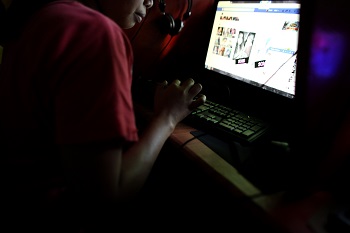A strong moral compass: how faith-based organizations can tackle online sexual exploitation of children
A new guide published aims to help religious communities worldwide harness their strengths to prevent on May 12, respond to and end online child sexual exploitation. Published by ECPAT International and Religions for Peace in partnership with UNICEF, Protecting Children from Online Sexual Exploitation recognises that religious leaders and communities can provide the moral compass that is needed to end this crime.

10 March 2016.In Metro Manila, for a few pesos children can have as much as 3 minutes of unsupervised internet connectivity. Internet cafes provide private chat rooms which facilitate live streaming of child sexual abuse.
Information and communications technologies and the Internet are exposing children to new and evolving forms of sexual exploitation, as seen in a staggering expansion of child sexual abuse materials online. Practices such as 'sexting' (the self-production and sharing of sexual messages or images) also place children at risk of sexual abuse and exploitation.
The new Guide recognises that faith-based organisations and religious leaders are in a unique position to mobilise moral authority on this issue, influence thinking, generate debate and set standards for others to follow. They are also well-placed to take action when offenders ask for help, and to give families the advice and the tools they need to protect their children.
“If the world is to eliminate online sexual exploitation of children, the world’s most influential bodies must play their part. And few – if any – have more influence than religious communities,” said Dorothy Rozga, Executive Director of ECPAT International, speaking at the launch of the Guide at the 5th Forum of the Global Network of Religions for Children (GNRC). “They are the largest and most inter-connected social organisations in existence. With most of the world’s population – around five billion people – belonging to religious communities, their potential to spearhead the fight against this appalling crime is immense,” said Rozga.
The Guide sets out the online risks to children and the impact of online child sexual exploitation, as well as the skewed motivations of offenders and intermediaries, including traffickers and pimps. Outlining the critical role of religious communities in addressing this crime, the guide notes their spiritual, moral and social influence, as well as their obligation to end violence against children. It provides the perspectives of different religions on child protection as well as the following step-by-step tips to help religious leaders and communities take action, seek justice and protect children.
Create safe and child-friendly places. All places of worship and religious institutions can offer safety, help and support for children and adolescents, including those who are victims of violence, and can help to build safe and child-friendly communities.
Raise awareness. People look to religious leaders for moral guidance and advice, and they can discuss these issues with their communities, using the new Guide to break taboos and start a conversation on how their faith tradition views sexual abuse and exploitation.
Report abuse. Religious leaders can encourage children and community members to report any cases of exploitation and abuse, and if anyone in the community is aware of, or concerned about, dangers to children, they can contact law enforcement or a confidential helpline to speak to a specialist third party.
Advocate for children. Religious leaders and faith communities can help to make the world a safer place for children and adolescents by sharing information on the risks and consequences of sexual violence and by supporting local institutions that protect the youngest citizens.
Work together. Religious communities can join with others to combine their vision, resources and experience to tackle online child sexual exploitation.
“Children are vulnerable to sexual exploitation online everywhere. We urge faith groups to use this guide to catalyze their deepest moral and spiritual capacities to ensure that the crime of sexual abuse of children is prevented. The world’s diverse religious communities must become allies in addressing this scandal everywhere--in local communities, on the national level and across regions,” said Dr. William Vendley, Secretary General of Religions for Peace.
“Online sexual abuse and exploitation is a growing global problem for girls and boys, many of whom suffer in silence at the hands of people closest to them in their homes and communities. Through their values, moral authority and extensive networks, religious communities and faith-based organizations play a critical role in helping to break the silence around this crime, protecting children from this atrocity and linking children affected to support services, essential for their healing and protection,” said UNICEF Director of Programmes Ted Chaiban.
Source:United Nations Children's Fund
- 348 reads
Human Rights
Fostering a More Humane World: The 28th Eurasian Economic Summi

Conscience, Hope, and Action: Keys to Global Peace and Sustainability

Ringing FOWPAL’s Peace Bell for the World:Nobel Peace Prize Laureates’ Visions and Actions

Protecting the World’s Cultural Diversity for a Sustainable Future

Puppet Show I International Friendship Day 2020

